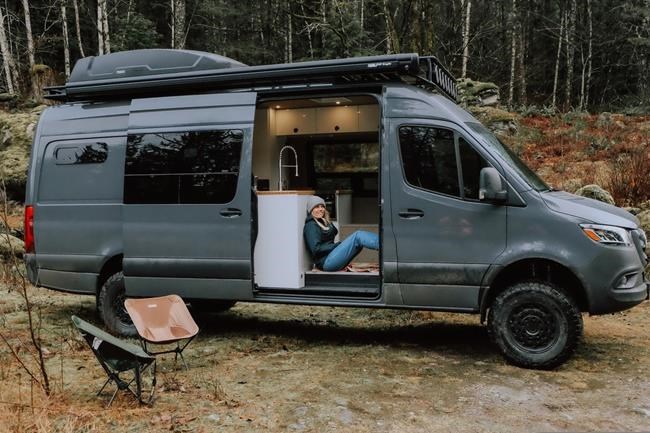Maxime Rico has been living in his 2014 Mercedes Sprinter for two years, splitting his time between the Yukon in summers and British Columbia in winters. He’s transformed the cargo van into a fully equipped living space with a diesel heater, and the only amenity he requires is a shower.
The 24 year old ski patroller at Sun Peaks Resort near Kamloops, B.C., says there’s been a clear rise in newcomers to "van life", especially among Ontarians and Quebeckers heading west to escape lockdowns in their provinces.
“There’s more and more people talking about it on social media and the trend has risen a lot,” said Rico.
“I’m really curious to see this summer how is going to look. There’s probably going to be a lot of people out here.”
People in the van life community, who live a mobile lifestyle in converted vans or trucks, say an increasing number of Canadians are experimenting with life on four wheels as a way of escaping the pandemic, and it’s driving up the value of used vans and trucks.
While Rico is living in his van indefinitely, he's noticed that people are getting into van life for shorter trips that span a few months or weeks.
Pura Vida Vans, which specializes in converting standard cargo vans into fully equipped living spaces, says it’s seeing a spike in demand for its services.
“Since COVID there's definitely been an increase in demand,” said Alex Hoelk, owner of Pura Vida Vans in Squamish, B.C., who says many people are starting to look at vans as a weekend “play thing.”
“I think a lot of that is people from all over Canada are unable to travel internationally as easily as they used to and they want a different mode for vacation.”
Hoelk said used vans that have already been converted are likely more expensive, especially because many companies that convert vans are booked up for the rest of the year.
Many of his clients spend upwards of $80,000 for a brand new Mercedes Sprinter and another $80,000 for the conversion, which can include features like solar panels and racks for sports gear.
A used stock Sprinter can cost around $35,000 Hoelk said, while some opt for cheaper setups using vans from the '80s and '90s.
Those on a budget will even convert old minivans into small living spaces, which can be done for under $10,000
While vans may be more expensive for new buyers, Rico said he’s glad to be insulated from the rising cost of rent in places like B.C., where remote workers have flocked and subsequently driven up the cost of living.
However, not everyone is keen on van life, and there are some who don’t look kindly upon the increase of vans in their neighbourhood. Rico said friends of his who live in vans with Ontario or Quebec license plates have had their tires slashed or brake lines cut.
He said the incidents happened in cities like Revelstoke, B.C., where there has been an influx of van lifers looking to live near recreation centres for skiing and mountain biking.
“People don’t generally appreciate random cars being parked in front of their houses these days — not that they like it regularly — but they hate it a lot more now,” said Rico.
“So trying to find a place to sleep is definitely quite a bit more complicated.”
Certain amenities, like bathrooms and showers, were also more difficult to come by as a result of physical distancing during COVID-19.
“Water supplies, showers, basic amenities like supermarkets were difficult to get to,” at the start of the pandemic, Rico says.
But as people adapted to life during the pandemic, Rico says van life went mostly back to normal.
“It’s definitely been easier now.”
This report by The Canadian Press was first published March 9, 2021.
Salmaan Farooqui, The Canadian Press



